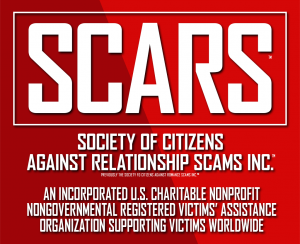Declaration For Victim’s Dignity
by the
Society of Citizens Against Relationship Scams
The position of the Society of Citizens Against Relationship Scams on the Dignity & Respect for Victims of Online Crime
Released: March 1, 2019 VERSION EN ESPAÑOL »
The Right to be Treated with Fairness, Dignity, and Respect
It is the position of the Society that there should be an International Convention of the Rights of Crime Victims.
This should encompass the rights and guarantees of Dignity, Fairness, and Respect for all victims of crime, but specifically for victims of socially engineered crimes that are less obviously crimes.
Twenty-three of the United States’ victims’ rights constitutional amendments and many state-level victims’ rights laws provide that crime victims shall be treated with fairness, dignity, and respect during all phases of the criminal justice process. This right is important to victims relationship scams but also to all other forms of crime which result in profound trauma – who have already endured and survived an especially brutal (physical or just psychological) and personal crime. Millions of victims have suffered a seemingly endless wait for justice as their evidence is uninvestigated, unverified, untested or backlogged for years. Crime victims deserve to be treated in a way that preserves their dignity, shows them respect, and demonstrates fairness. In some jurisdictions, these rights may be interpreted to apply before a suspect is charged and during the time in which a victim comes forward when the evidence gathering is taking place and during any resulting investigation.
DECLARATION OF ONLINE CRIME VICTIM’S DIGNITY
WE, the Society of Citizens of Citizens Against Relationship Scams declare that victims’ of online crime have an absolute right to be treated in fairness, with respect and dignity by all participants of the International Law Enforcement and Criminal Justice Institutions throughout the world.
WE call on all nations to enact into law a basic set of provisions, and to train their law enforcement, the criminal justice system, and courts systems to be sensitive to the trauma that these victims have experienced and to respect the following rights:
- The Right to be Heard
Every victim of cybercrime has the right to be heard by law enforcement officers in a fair dignified and non-judgmental process
– - The Right to Report the Crime
Every victim of a cybercrime shall be allowed to report the crime without resistance or prejudice
– - The Right to be Helped to Gather Evidence for Criminal Reporting
Be helped by law enforcement to prepare their report of the cybercrime in a way that can be useful for law enforcement and for use against the perpetrator
– - The Right to be Informed and Guided through the Criminal Justice Process
Be given an explanation of how scams work and what the victim can expect from the law enforcement process
– - The Right to Realistic Expectations
Be informed of realistic expectations as a result of their cybercrime criminal complaint or reporting – including the possibilities for law enforcement actions which include Investigation, Apprehension of the Cybercriminal, and Recovery of the victim’s Assets – as well as limitations of the process
– - The Right to have Access to Victims’ Assistance
Be referred to a lawful and ethical Scam Victims’ Assistance and Support Provider that is recognized, registered, and certified by global organizations such as the Society of Citizens Against Relationship Scams, the National Center for Victims of Crime, or other equivalents
– - The right to be free from intimidation, harassment, and abuse
Be protected from further abuse by law enforcement officers and other of the criminal justice system
– - The Right to Reasonable Protections from Retaliation
Be reasonably protected from the accused offender in real life and on the Internat
– - The Right to Withhold Their Identity
Be able to have their identity kept confidential unless they chose to make it public
– - The Right to be Kept Informed
Be notified of actions that affect them directly during Investigation or other actions by the criminal justice system
– - The Right to be Heard in Cybercriminal Sentencing
Be able to be heard in person or by other recorded means, including a written statement about the impact of the cybercrime on their lives or those of the family in the court’s decisions for fair and appropriate incarceration sentencing
WE declare that governments around the world must preserve and protect the right of online crime victims to achieve justice, ensure a meaningful role throughout the criminal justice systems for crime victims, and ensure that crime victims’ rights and interests are respected and protected by law in a manner no less vigorous than protections afforded to criminal defendants.
WE ask all governments to enact the foregoing with immediate urgency and as soon as possible to codify these civil rights of victims of cybercrime in law.
This Declaration and Statement has been prepared by the SCARS Committee on Victims’ Rights and approved by the Society Board of Directors on February 1, 2019, for publication on March 1, 2019
Certified by: Shirley Zhang, Corporate Secretary


